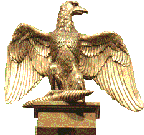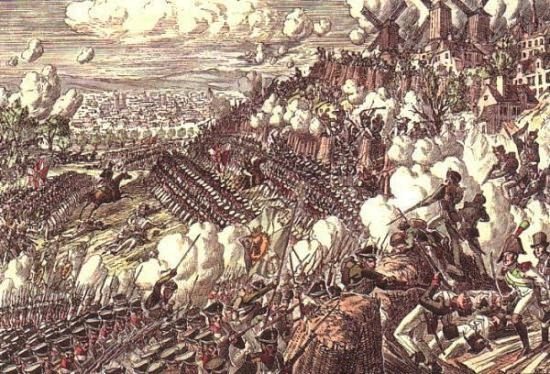
The Battle of Paris, 1814.
No Hostile Army Had Reached Paris For 400 Years.

1. Paris and France in 1814.
2. Military Operations - "It's a Beautiful Chess Move !"
3. Battle of Paris, March 30-31st 1814.
- - - - - - - Troops and Deployment.
- - - - - - - "To Arms !"
- - - - - - - Montmartre Heights.
- - - - - - - The Capitulation - "Joseph is an ass..."
4. The Allies Entered Paris.
- - - - - - - The Cossacks enjoyed their time in Paris.
- - - - - - - French Royalists and the English.
- - - - - - - The Bourbons.
5. The Raging Guard and Napoleon's Abdication.
6. The Grande Finale: Allies Meeting in London.

|

Paris and France in 1814.
Russian author Mikhailovski-Danilevski wrote: "On January 1st we crossed the Rhein River in Basel and loud "Hurah !" announced that we were finally in France, the goal of our march, where, in the heart of Napoleon’s power, we were going to give him coup de grace. ... Our quarters in France were very dissatisfying; we found that the French are less educated than Germans, so our officers, taught by their tutors that France was El Dorado, were unpleasantly surprised to see poverty, untidiness, ignorance and low spirits in villages and towns. French, since Revolution, have experienced so many sufferings ... However skillful were maneuvers of the enemy, our numbers suppressed him ... " (Mikhailovski-Danilevski - "Memoires 1814-1815") In April 1814 Allies armies reached Paris. (ext.link) Paris was a 19th century metropolis. It had 550,000 people. The overall impression of the city was created by its theaters, gardens, museums, Ecole Militaire, Champ-de-Mars, monuments, churches, broad avenues and grand palaces. Paris was the capital of great country. France was one of the most populous and wealthiest countries in the World, the leading political, military and cultural power. The French language was spoken in all European countries.
Marbot described the situation in Paris: "Sadly, loyalty to the Emperor was so much diminished in the Senate and the legislative body, that there were leading members of these assemblies, such as Tallyrand, the Duc de Dalberg, Laisné and others, who through secret emissaries informed the allied sovereigns of the dissatisfaction among the upper-class Parisians with Napoleon, and invited them to come and attack the capital."
|
|

Military Operations.
Napoleon had appointed his wife, Marie Louise, as regent and had left Paris to place himself at the head of the French army. His soldiers were young and exhausted, they fought and died hard. And the Emperor loved them. From the beginning of this campaign Napoleon had "put on his Italian boots" and disconcerted the Allies by the rapidity of his maneuvers. He was able to race from one Aliies' army to the other and confront them successively. The old but energetic Blucher was badly beaten at Champaubert, Montmirail, Chateau-Thierry and Vauchamps. The younger but slower Schwarzenberg was caught at Montereau and defeated.
Meanwhile Napoleon's own minister Talleyrand sent a secret letter to the Allies describing how the popular sentiment in Paris was running strongly against Napoleon and that the city would joyfully open its gates to the Russians, Prussians and Austrians as soon as they showed themselves on the horizon. Talleyrand was a prototype of the witty, cynical diplomat. His corruption was undeniable, and his pliability enabled him to hold power under the ancien régime, the Revolution, Napoleon, the Restoration, and the July Monarchy.
|
|

The Battle of Paris, March 30-31st, 1814.
Troops and Deployment.
"To Arms !"
At daybreak the fighting began and Parisians had been watching the battle through telescopes.
As the escalating roar of battle gave evidence that the Allies had begun their great assault, blue-clad troops of Mortier came sweeping toward the eastern suburbs, driving Allies skirmishers before them. Between 6 and 7 a.m. a sharp fight took place near Romainville, whose strategic importance was considerable. The green-clad Russians dislodged the Young Guard but with the support of artillery and 11th Voltigeur Regiment of Young Guard the French counterattacked.
Montmartre Heights.
The Capitulation.
By this time Talleyrand had presented the keys of Paris to the Tsar.
|
|

The Allies Entered Paris.
The reaction of Parisians to the occupying forces varied, some were angry and hostile, while other were very friendly. Very hostile group surrounded several Russian officers. The Russians dashed to nearby shop but the crowd followed them. One Frenchwoman approached them and set her fist at the face of officer Löwenstern, cursing and shouting. The French National Guard arrived and walked the Russians into safety. But when Russian hussars under Pahlen crossed the Austerlitz Bridge they were met by groups of royalists who offered bread and wine. Some hussars of became so drunk so quickly that they had trouble to stay in saddles ! The French royalists were mad with joy and paraded the streets shouting "Long live the Bourbons !" The new Governor of Paris became Russian General Sacken. He distinguished himself in recent battle of La Rothiere. Within next months there were held reviews of the Allies' troops with thousands of Parisians as curious spectators. The troops were ordered drilling and spit and polish sessions to look at their best. The Cossacks set their headgears with an air of defiance and cheerfulness everytime they passed the monuments erected for the glory of the French army. The victorious Allies troops have taken part in military parades. The Russians made remarks that they were busier because of the preparations to parades than during the campaign. The French, British and German observers expressed their enthiusiasm for the way the Russian Guardsmen looked and marched. The crowd's reaction was one of bewildered awe.
A Russian officer Glinka was impressed with Paris and its surroundings. He wrote that all the villages around Paris were well build, and the castles, palaces and gardens with fountains decorated the landscape. Only the smell of decomposed bodies of recently killed soldiers and horses spoiled the picture and polluted the air. Another officer, Löwenstern, experienced an indescribable feeling when he first time saw Paris. As he wrote, this is from this city laws, fashion and culture radiated on the entire Europe.
During the occupation, "the British were looked down, the Prussians were hated but the Russians succeeded to create a friendly relationship with the French." Just like the town of Givet, which was so relieved to receive a Russian garrison and to see the departure of the Prussians. The Russian army stayed in Paris in its vicinity from spring to summer 1814. Then part of the troops and the Guard was ordered to march home.
The Cossacks enjoyed their time in Paris.
French Royalists and the English.
The Bourbons.
|
|

The Raging Guard and Napoleon's Abdication.
On April 7th Napoleon called for volunteers from his Old Guard to serve in his guard on Elba Island. The Allies allowed for 500 infantrymen, 120 cavalrymen and 120 artillerymen.
Generals Petit and Pelet were soon swamped with requests. Many officers asked to serve as simple privates. Out of 400 volunteers of Guard Artillery 100 were selected for Elba. Out of the Marines 21 men were accepted, and out of the entire French and Polish cavalry only 100 Polish lancers were chosen. There were additionally several hundred volunteers from infantry, 300 grenadiers and 300 chasseurs of Old Guard. Charles Parquin wrote: "General Krasinski who commanded the Polish lancers ... came forward with his officers. As he took his leave of the Emperor he uttered these words, which do the greatest credit to his nation: "Sire, if you had mounted the throne of Poland, you would have been killed upon it; but the Poles would have died at your feet to a man."
The French Old Guard and Polish lancers lit torches and marched to the city shouting "Down with the traitors ! On to Paris !" But the marshals were tired of fighting.
On April 20, 1814 the Emperor of France bid farewell to the soldiers of his Old Guard.
Tears trickled down their cheeks and they struggled to maintain composure (see picture) when he said:
When Napoleon left France for Elba Island the Bourbons have returned. They were disliked by many Frenchmen and political caricatures and cartoons appeared on walls. On one of them showed the fat King Louis XVIII riding behind a Cossack, "over the corpses of French soldiers."
|
|

The Grande Finale: Allies Meeting in London. In England news of Napoleon downfall was greeted with euphoria and Tsar Alexandr's earlier duplicity was forgotten while the English newspapers heaped praise upon the Russian troops. When Allies leaders (Tsar Alexander, King of Prussia, Prince Metternich, Prince of Liechtenstein, Hannoverian Prince, generals Schwarzenberg, Blucher, Platov, de Tolly and many others) disembarked at Dover, they realized that the Brits were as infatuated with them as the Parisians (or rather the French royalists). Huge crowds cheered him along the road. The Londoners unhitched the horses from the barouche in which the Tasr was sitting with the King of Prussia and pulled the carriage through the streets. The monarch counted on his charm to help him to win also over British politicians. While the monarch was waiting for a visit from the Prince Regent, an enthusiastic crowd gathered in front of the house. "Twenty times Tsar Alexander had to appear on the balcony to respond to the ovations of the English." (- Henri Troyat)
Events in London
The Allies were showered with gifts and awards. Tsar Alexander received an honorary doctorate from Oxford University and showed himself in Hyde Park on horseback dressed in English uniform. He also visited Westminster, the British Museum and the races at Ascot.
The Tsar met with the Quakers and discussed religious questions and talked with Jeremy Bentham, a philosopher and jurist.
He was also invited to Guildhall, at which 700 guests gathered. Italian singers did their best to charm the distinguished guests and the dinner was served on gold plates. Suddenly the Russian Grand Duchess Catherine abruptly asked that the Italians be silent, she detested music. Alexander was hard of hearing and didn't understand the embarrassed murmurs all around him. Her demand threw the company into great confusion and the monarch couldn't wait to leave this country that was so proper, cold and stiff.
After Napoleon' abdication in 1814 a congress met in Vienna. When the eagle was silent, the parrots began to jabber.
|

Links.